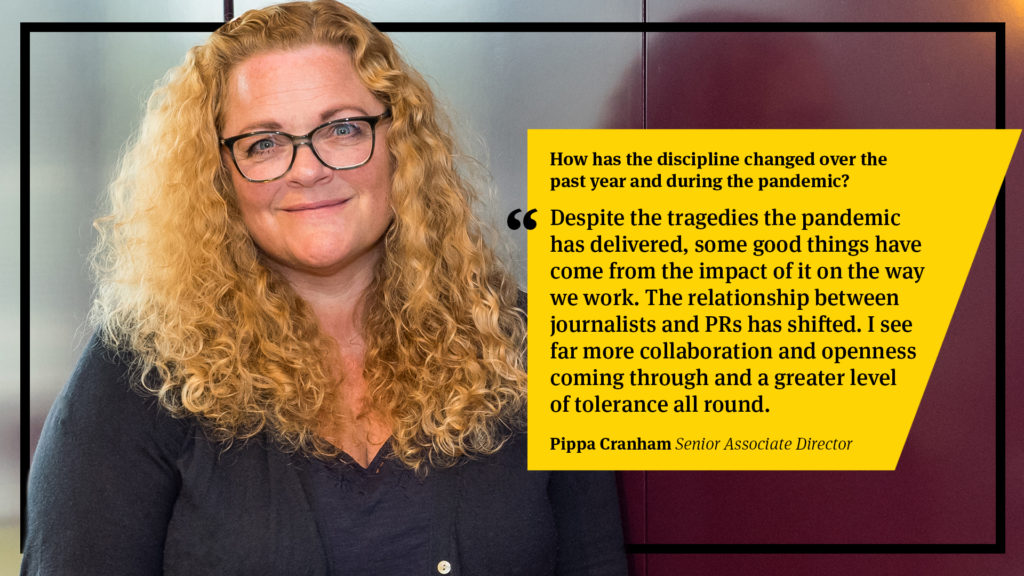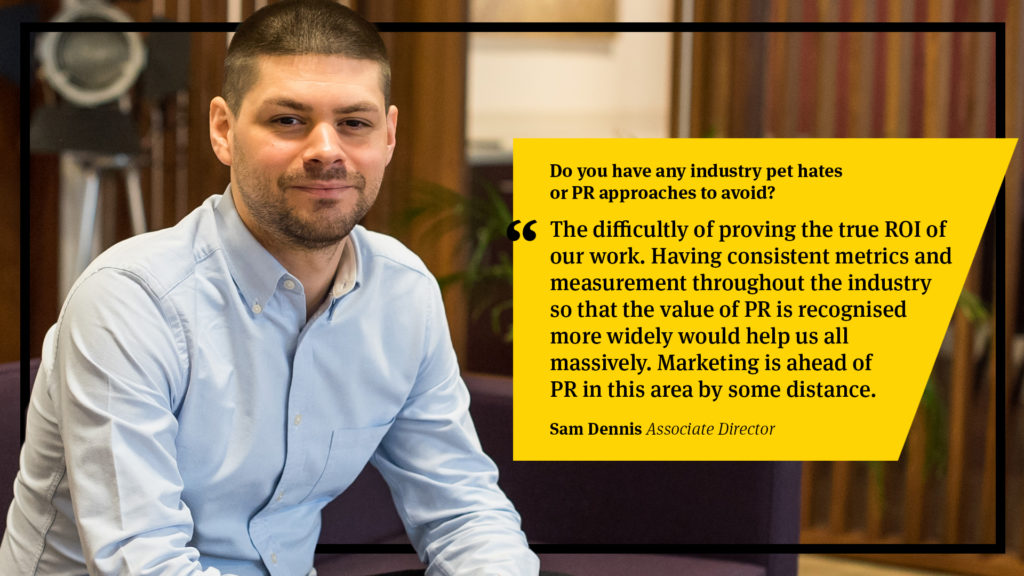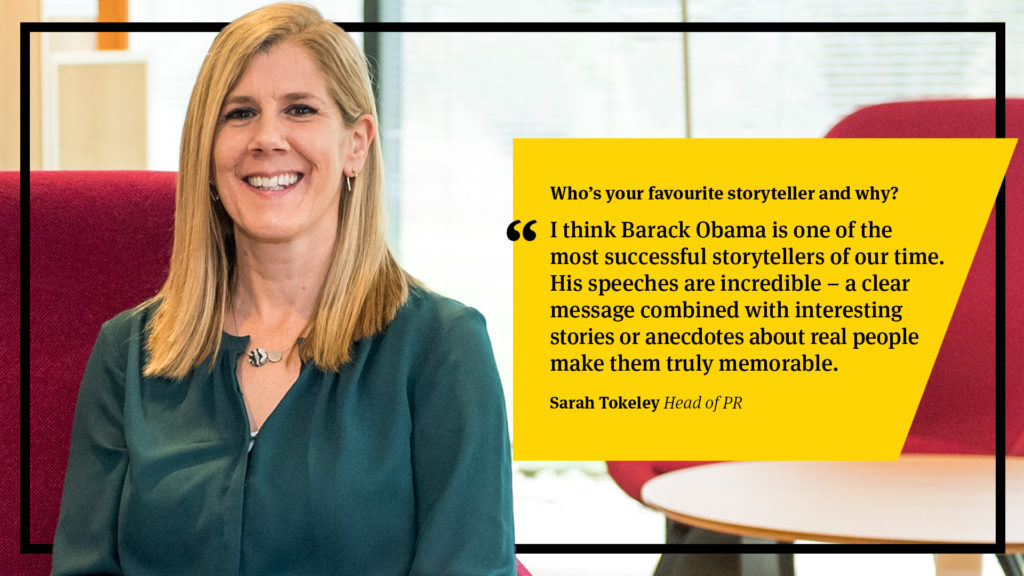Meet the team
Meet the team: Our top PR experts on storytelling success and the measurement minefield
This month’s Meet the Team introduces our senior PR team and their insights into what it takes to make it in today’s competitive environment. Head of PR, Sarah Tokeley; senior associate director, Pippa Cranham; and associate director, Sam Dennis, all share their thoughts on the positives we can take from the pandemic, the best PR campaigns from the past 12 months, and the age-old question of how best to measure success.
How long have you worked in PR and what first attracted you to the industry?
SARAH: I’ve worked in the PR industry for 20 years, which basically makes me feel old! There was a lot that attracted me in the first place, including the varied nature of the role, the fast pace, and the opportunity to network and build relationships within the industry.
SAM: Just over 10 years now. I studied journalism and quickly began to understand the important role PR played in media and business. I enjoyed that it had a strong commercial element to it and no two days are ever the same.
PIPPA: I started in PR over 20 years ago and, if I’m honest, fell into the industry. I was working at a publishing company as a PA, but the Marketing and PR Dept seemed to be where the interesting things happened. The idea of speaking with journalists, launching books and attending events, seemed far more interesting than what I was doing, and it spurred me into looking for my first PR agency role.
What is your proudest achievement at Berkeley so far?
SAM: There isn’t one that stands out specifically above all others. I am lucky that there are many parts of the job that I enjoy. Hitting the KPIs for clients each quarter and winning new business would have to be top of my list currently though.
PIPPA: Seeing my teams receive enthusiastic, congratulatory emails from clients, having a well-written piece of content speed past the client with no amends, seeing campaigns I have helped create exceed objectives and expectations, all give me reasons to be proud.
But, if I had to pick one, it would be the fruition of a lot of hard work come to its pinnacle in an event we held for Staples on Blue Monday a couple of years ago. There were over 500 people through the door, on a target of 50-100, we secured national print and broadcast coverage and the day was rounded off with puppies and a happy client – oh, and cocktails.
SARAH: I’ve been at Berkeley for just over a year now and what a year it’s been! It’s not a personal achievement – and I hope this doesn’t sound too cliched and obvious – but I’ve been most proud of how the team has adapted to the situation caused by the pandemic and continued to deliver fantastic results for clients
What three attributes do you think are the most important to building a successful career in PR?
SAM: I am going to break the rules here and say four, as I think these are all equally important. Motivation, resilience, creativity, and a positive mindset are all essential to thrive in this industry.
SARAH: You’ll often be working in challenging and fast-paced environments, so you need to be a strong communicator, highly adaptable and a creative thinker.
PIPPA: I agree with Sam that resilience has to be a core attribute, along with perseverance, initiative and the ability to get to the heart of a story to tell it effectively. I also believe that a healthy sense of humour can definitely help you through the tougher days.
How has the discipline changed over the past year and during the pandemic?
PIPPA: Despite the tragedies the pandemic has delivered, some good things have come from the impact of it on the way we work. The relationship between journalists and PRs has shifted. I see far more collaboration and openness coming through and a greater level of tolerance all round. The pandemic has highlighted the human element of who we are in the workplace. At Berkeley, this has reinforced the storytelling element of what we do – remembering there is always a person at the end of our work even though it is often B2B.

SAM: The pandemic has dispelled the myth that it would not be possible for a PR agency to function successfully with all staff working remotely. PR agencies have proven how adaptable they are and during one of the most challenging times in a generation, we have been able to keep that creativity, teamwork and collaboration alive and kicking.
SARAH: I think it’s fair to say that the pandemic has highlighted the important role PR can play. Businesses have relied on the PR function to communicate the ‘right’ message at a difficult time. As a result, PR has moved higher on some C-suite agendas – and rightly so.
What’s your favourite PR campaign from the past 12 months and why? (not one of your own!)
PIPPA: I really wanted to choose the Ogilvy campaign on behalf of Girl Up, “Today We Rise”- marking the milestone moment of Kamala Harris being sworn in. It speaks to many of us, on so many levels, and is a real cause for celebration. But then I realised that it’s not really a PR campaign, so I’d have to come up with something else.
The next campaign that sprung to mind is from Burger King inviting consumers to support its greatest rival, McDonald’s. The company positively encouraged people to support all of their competitors, and we all understood that nobody wanted businesses to fold or people to lose jobs. I also liked that they went back for a second bite (forgive me) when they realised that they had left out the smaller, independents.
SARAH: Who could forget KFC’s ‘We’re back’ campaign using videos from customers who had attempted to recreate KFC meals during quarantine? It was wholly in keeping with the brand’s tongue-in-cheek style and felt like a much-needed moment of light relief.
SAM: I would have to say Marcus Rashford’s fight for free school meals, which has resulted in a change of government policy. The success of his campaign shows the power of communications and that authentic delivery, across the right platforms, in the right tone, and at the right time will get results.
What role does creativity play in the success of campaigns?
SARAH: Creativity plays a crucial role in the success of campaigns – and it’s true that the simplest ideas are often the best. However, a creative idea is not enough on its own. Success will only really come with the strong planning and execution required to bring the idea to life.
SAM: It is always a key element, but I would say having a diverse mix of people who think differently is most important to maximising the success of a campaign. If you have a diverse team then you are setting yourself up to unlock the best creative ideas.
PIPPA: Creativity is vital to lift a campaign from the mundane to the impactful. Thinking creatively can be the key to shifting messaging from being informative and awareness-raising, to behaviour-changing and decision-making. Creativity doesn’t have to be big and ‘budget busting’ though. Small moments of really relevant, creative thought can be just as effective. And, apart from anything else, it’s the fun stuff that keeps us on our toes.
Do you have any industry pet hates or PR approaches to avoid?
SAM: The difficultly of proving the true ROI of our work. Having consistent metrics and measurement throughout the industry so that the value of PR is recognised more widely would help us all massively. Marketing is ahead of PR in this area by some distance.

SARAH: I agree that it has to be about measurement and the vanity metrics that are still used in PR. As an industry, we’ve historically struggled to demonstrate our value in meaningful and commercial ways. Although this has been changing for some time now, there’s still too much reliance on worthless metrics to determine whether a campaign has been successful or not.
How do you see the role of PR evolving in the next five years?
PIPPA: PR has already evolved to become a more integrated, multi-discipline offering, but I see it going a step further in the near future, where the lines between earned and paid media will blur. I can see us creating campaigns that incorporate an agreed spend to deliver against clients’ objectives but are still handled by the PR teams. I also wonder if, following the past year, we will see an upsurge in experiential activations and a greater appreciation for events.
SAM: I think the pandemic has highlighted how critical PR and communications are for a business. The importance of having strong integrated communications and a brand that consumers are proud to associate themselves with is more evident than ever. Over the next five years, I see the impact of PR being higher on the C-suite agenda.
SARAH: Over my 20 years, I’ve seen some significant changes to the PR industry – I even remember the days before social media! In more recent years, it’s been exciting to see PR become more closely integrated within the marketing mix. This will only continue to gather pace over the coming years.
What is the one piece of advice you’d give to someone wanting to get into the industry?
SAM: Enthusiasm and a willingness to go the extra mile can really make you stand out from a crowd of applicants. You can have all the intellect and talent in the world but if you don’t work hard it is pointless. To steal a quote often used in sport, “Hard work beats talent, when talent doesn’t work hard.”
SARAH: It continues to be a competitive industry, so my advice is to build up some work experience or undertake an internship if you can. When applying for a role, this could give you the edge over another candidate with a similar degree – and you’ll get a lot from the experience too.
PIPPA: Really take the time to understand what PR is and the breadth of the PR industry. I would also advise that people not forget who they are in the desire to land a role. PR is a creative industry, and it should thrive on all kinds of diversity, so bring all that you are and don’t be afraid to show your personality.
Who’s your favourite storyteller and why?
SARAH: I think Barack Obama is one of the most successful storytellers of our time. His speeches are incredible – a clear message combined with interesting stories or anecdotes about real people make them truly memorable.

SAM: Steve Jobs. He transformed unimaginative product launches into an experience more like a theatre production. His use of storytelling changed the way people view technology and connected emotionally with consumers to make Apple one of the most valuable brands on the planet. That takes some beating.
PIPPA: Maya Angelou. Whenever I read her work, I am transported and immersed into the moment and can hear her distinctive voice in my head bringing the words to life – total escapism. Like all good tales, her storytelling is carried with me, informs me, and helps shape my thinking.
